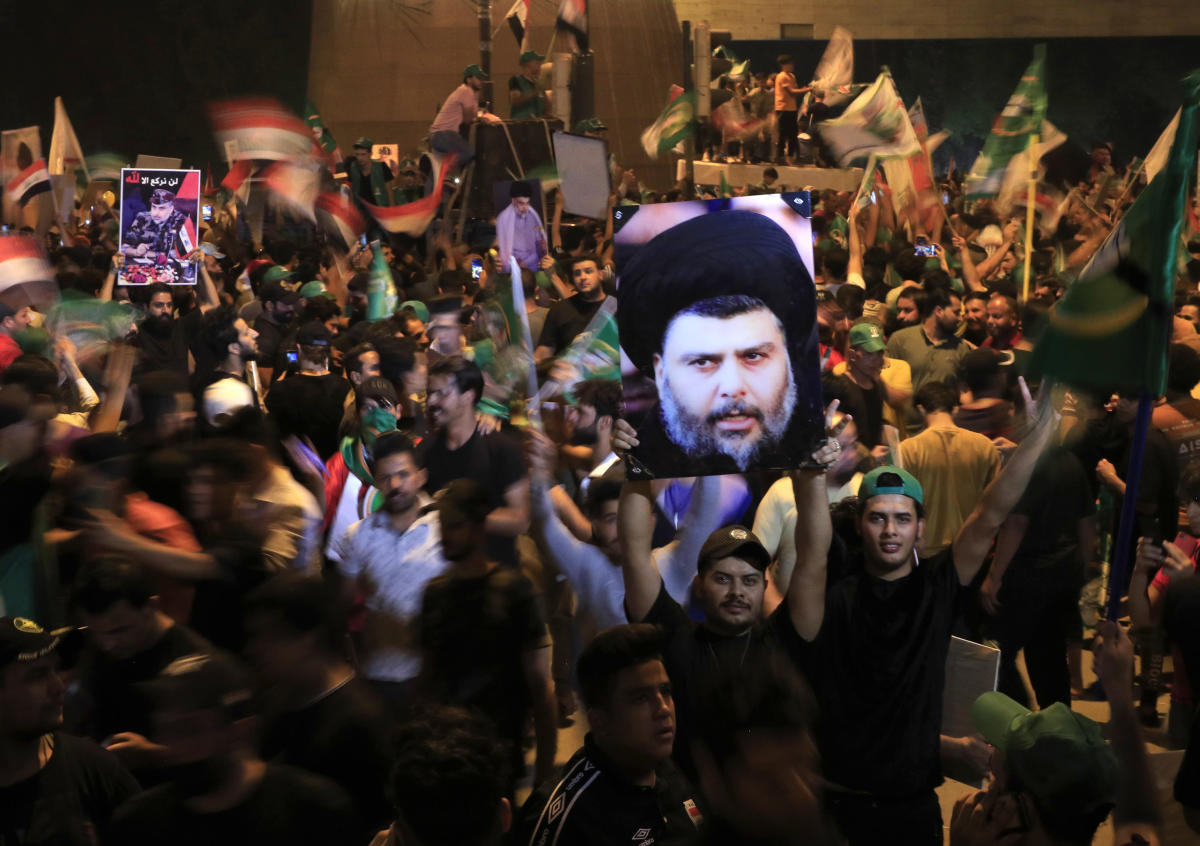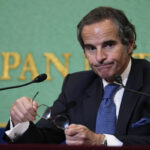
BAGHDAD (AP) — Eight months after national elections, Iraq still doesn’t have a government and there seems to be no clear way out of the dangerous deadlock.
Political elites are embroiled in cutthroat competition for power, even as the country faces growing challenges, including an impending food crisis resulting from severe drought and the war in Ukraine.
For ordinary Iraqis, everything is delayed. The caretaker government is unable to make crucial electricity payments or draft plans for badly needed investment ahead of the critical summer months. Investments to upgrade water infrastructure have been paused while unemployment, water shortages and concerns over food security are drawing public anger.
The election was held several months earlier than expected, in response to mass protests that broke out in late 2019 and saw tens of thousands rally against endemic corruption, poor services and unemployment.
The vote brought victory for powerful Shiite cleric Muqtada al-Sadr and was a blow for his Iran-backed Shiite rivals, who lost about two-thirds of their seats and have rejected the results.
Personal vendettas spanning decades underpin the Shiite rivalry, pitting al-Sadr and his Kurdish and Sunni allies on one side against the Coordination Framework, a coalition led by Iran-backed Shiite parties, and their allies on the other. In the middle are the independents, themselves divided amid attempts by rival factions to lure them to either side.
“It’s not about power; it’s about survival,” said Sajad Jiyad, an Iraq-based fellow with The Century Foundation.
Meanwhile, anger among the Iraqi public is growing as food prices soar and electricity cuts worsen.
Last month, caretaker Prime Minister Mustafa al-Kadhimi was forced to leave the Baghdad funeral of a celebrated poet after some mourners began chanting anti-government slogans and pelting the convoys of other government officials.
“Political obstruction impacts the work of the government and the state, and lowers the morale of citizens,” al-Kadhimi told reporters on Tuesday, blaming the impasse for obstructing his reform plans.
The U.N. envoy for Iraq, Jeanine Hennis-Plasschaert, warned Iraqi political leaders last month that “the streets are about to boil over” and said national interests were “taking a backseat to short-sighted considerations of control over resources.”
Al-Sadr, whose party garnered the most seats in the election, has not been able to corral enough lawmakers to parliament to get the two-thirds majority needed to elect Iraq’s next president — a necessary step ahead of naming the next prime minister and selecting a Cabinet.
Al-Sadr’s tripartite alliance includes Taqadum, a Sunni party led by Mohammed Halbousi who was elected parliament speaker in January, and the Kurdish Democratic Party lead by Masoud Barzani. The bloc is intent on forming a majority government, which would be a first since a consensus-based power-sharing system was introduced following the 2003 U.S. invasion of Iraq to oust dictator Saddam Hussein.
The government would exclude Iran-backed Shiite rivals of the Coordination Framework, which includes former Prime Minister Nouri al-Maliki’s State of Law and the Kurdish Patriotic Union of Kurdistan party.
Both al-Sadr and al-Maliki, longtime bitter political adversaries, have built up loyalists throughout ministries to advance their political agendas and fear that if in power, the other will use state resources — including the judiciary, anti-corruption committees — to purge institutions of rivals.
Also, al-Sadr and Qais al-Khazali, whose powerful Iranian-backed militia is part of the Framework alliance, are engaged in a deadly feud, with assassination campaigns targeting members of their militias across Iraq’s Shiite southern heartland.
Paradoxically, the current stalemate is in part a consequence of parties moving away from sectarian-oriented groups. In the past, Shiite alliances would form a united front to negotiate with Sunni and Kurdish blocs. But this time, alliances have crossed sectarian lines, inflaming tensions within each sect.
In the absence of an agreement, many fear violent protests by al-Sadr’s large grassroots following and potential clashes with Iran-backed militias.
In a May 16 speech, a visibly frustrated al-Sadr pledged never to strike a deal with his rivals. He also alluded to the capabilities of his own militia, Saraya Salam, which recently opened the doors for recruits in Babylon and Diyala provinces.
In a sign of positions hardening, al-Sadr again vowed on Thursday not to back down and called on lawmakers from his bloc to prepare their resignations, although he stopped short of asking them to resign.
Al-Sadr was also angered by a recent Iraqi Supreme Court decision prohibiting the caretaker government from drafting and passing laws. This effectively struck down an emergency food bill needed for the caretaker government to use public funds to pay for food items and buy energy from Iran in the absence of a budget.
Al-Sadr, who had pushed the bill, saw the court’s decision as a move leaning toward the Framework. However, in a small win for al-Sadr, Parliament convened late Wednesday and passed the food security bill.
Iraqi militia leaders speak privately of concerns that the stalemate could ignite street protests by supporters of al-Sadr and dissolve into violence between them and rival armed Shiite militias.
Iraq has in the past seen protracted political wrangling among rival groups on choosing a new president and prime minister, though the current stalemate in electing a president is the longest yet.
This time, Iran has not been able to mend rifts between Shiite rivals — a role that used to fall to the top Iranian general, Qassem Soleimani, who was killed in a U.S. drone strike in January 2020. At least three trips to Iraq by Soleimani’s successor to mediate among Shiites failed to produce a breakthrough.
Recently, Tehran cut 5 million cubic meters of gas exports to Baghdad, citing non-payment issues. Iraq’s Electricity Minister Adel Karim told The Associated Press last month he had no idea how Iraq would pay the nearly $1.7 billion in arrears before the scorching summer months.
Meanwhile, the independents — parties drawn from the 2019 protest movement who ran under the so-called Imtidad list and won nine seats in the 329-seat legislature — seem to have lost their way. They had sworn to become a formidable opposition force to represent the protesters’ demands in parliament.
The head of the movement, Alaa Rikabi, recently froze his position after members resigned over his vote in favor of electing Halbousi as parliament speaker. The protesters see Halbousi as complicit in the killings of activists during the protests.
A spokesman for Imtidad, Rasoul Al-Saray, said the two Shiite blocs want to use the independents “to cover their failure to form a government.”
Some independents have said they faced threats and fear for their lives; one said he was offered tens of thousands of dollars in way of bribes to side with the anti-Sadrist group. The independents spoke anonymously, fearing for their safety.
With prospects for a consensus government dwindling, some have floated the option of new elections.
But Jiyad, the Century fellow, disagrees.
“It’s starting from zero and a risk to everyone,” he said.




